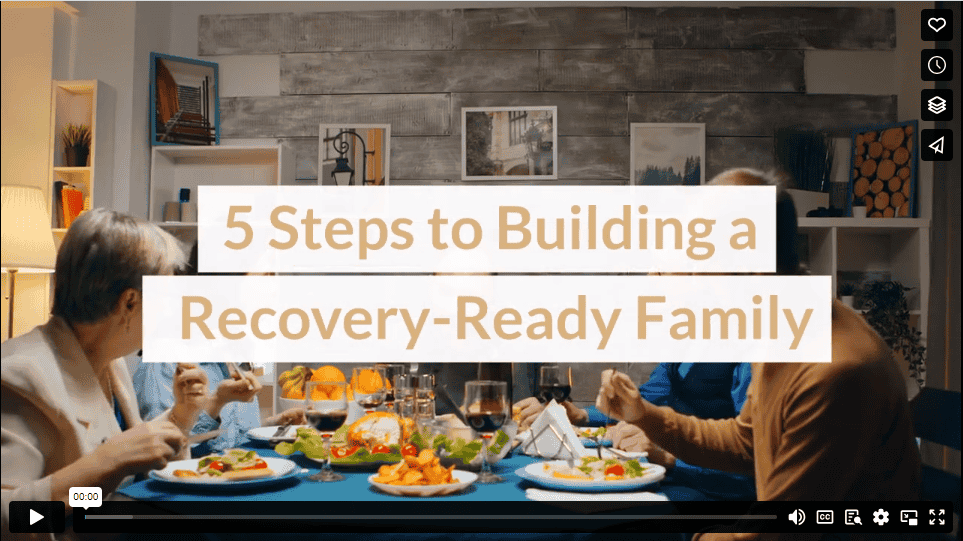You never think it will happen to you ‐ until it does. Drug and alcohol abuse levels have reached crisis-level proportions here in the United States, so it’s more a matter of when, not if, the battle against addiction will land on your doorstep. You and your loved ones need to be ready.
“I don’t believe it’s a coincidence that we celebrate National Emergency Preparedness and National Recovery in the same month,” said Preston Dixon, COO at Renaissance Ranch, a faith-based recovery program in Utah. “It makes sense to me that you should prepare your family for emotional traumas like substance abuse with nearly as much forethought as you need to plan for a natural disaster,” he continued.
“It’s devastating to learn that a family member has a problem with drug or alcohol addiction, but the situation is far from hopeless. Being up-to-date on the supportive resources available in your church and greater community gives you the assurance and direction to navigate a crisis like substance abuse without falling apart emotionally,” Dixon said.
Let’s discuss five ways you can bolster your family’s emotional preparedness before substance abuse hits home:

(Pablo Merchán Montes/unsplash)
1. Learn About the Nature of Addiction and Your Family’s Risks
The American Medical Association defines Substance Use Disorder (SUD) as a chronic disease, like asthma or diabetes. And as with many chronic diseases, it can pass from generation to generation. It’s critical to know your risk factors, like whether you have a history of mental health issues, which can trigger addiction, or if substance abuse runs in the family.
In addition, the stigma that surrounds people affected by SUD often prevents them from coming forward and seeking the help they need. Even now, society often sees addicts as weak, lazy, reckless individuals with no self-control. You wouldn’t tell an asthmatic in the middle of an episode to will his bronchial tubes to open back up and then call him weak if he couldn’t. So, why do we assume that a person who has developed an SUD and can’t quit just needs to exercise more willpower?
Addictive substances change the brain’s chemistry, sometimes immediately, by flooding its reward system with dopamine. Altering the brain structure and processes like this negatively affects metabolism, judgment, self-control, learning, and memory, making it nearly impossible to quit on your own.
You could have all the willpower in the world, but it still wouldn’t be enough to fully overcome addiction, especially if your genetics and environment are working against you. Achieving and maintaining long-term sobriety requires family support, connection with others in recovery, and a professional substance abuse rehab team.
2. Teach (and Practice) Abstinence, Moderation
It’s a no-brainer that the best way not to become addicted is never to take that first drink or hit. However, when you throw in peer pressure, mental health disorders, genetic predispositions, social media influences, and poor role models, the concept of prevention becomes far more complicated. The antidote to this complexity is involvement – we must actively participate in our children’s and other loved ones’ lives if we want to help them avoid the trap of substance abuse.
A great place to start is by maintaining open, non-judgmental communication. Your friends, kids, or spouse need to know they can come to you for help when in trouble or when they have questions. And that you won’t shame them for the mistakes they make. They need to know that no matter what they do, you love them wholeheartedly, and that will never change. The second aspect of good communication involves taking the time to talk with your loved ones regularly about the dangers of drug and alcohol abuse.
Finally, be a good role model. Drink alcohol in moderation and never encourage underage drinking, even for special occasions. Don’t abuse prescription drugs and keep them where other family members can’t access them. Don’t use naturally occurring (and now legal in many states) recreational drugs, like mushrooms and marijuana, in front of your loved ones. Marijuana can be addictive and is highly detrimental to young, developing minds. And, of course, stay away from illicit drugs entirely and don’t glorify any past usage.
3. Build Emotional Resilience
Developing emotional resilience means learning to manage the anxiety and stress that inevitably come into your life when you face challenges, trauma, and disappointment.
One way to build emotional resilience is to make time each day for self-care. Attend a regular yoga class, keep a gratitude journal, practice intentional breathing and stretching, go for a walk in nature, or find a quiet corner to read the holy scriptures and talk to God in prayer. Encourage your loved ones to do the same, especially those in your family, by scheduling regular electronics-free time for de-stressing.
Consider spending time in purposeful activities, such as serving food at a local homeless shelter or helping a child learn to read. Pursuits like these teach empathy and build connections, which are essential in developing emotional resilience.
Attending worship services and participating in a community of faith can also do much to fortify you and your family against emotional hardships. A 2019 article in the Journal of Religion and Health reported that out of 184 different studies, 84% found that faith lowered drug abuse risk. Research on alcohol abuse showed nearly the same findings – 90% of 145 studies cited faith as a critical factor in lowering abuse risk.
4. Get to Know the Substance Abuse Rehab Programs Near You
Just like you need to know where the emergency shelters are in a natural disaster, it’s a great idea to have a basic knowledge of the alcohol and drug rehab programs in your area. Consider researching local addiction recovery centers, what kind of care they offer, how much they cost, and whether or not they accept your insurance.
You should also learn what kind of recovery resources your church and community have to offer. These institutions typically host weekly 12-Step groups sponsored by National organizations like Narcotics Anonymous and Alcoholics Anonymous or have developed their own addiction recovery solutions.
5. Attend a Class or Webinar on How to Support a Loved One in Treatment
This month, you will find a treasure trove of important information on the Substance Abuse and Mental Health Services Administration (SAMHSA) website, including daily webinars on topics like opioid abuse stigma, family and peer support in recovery, and sustaining recovery. If you miss a particular episode, stay tuned to the website for links to watch it later, as all the webinars are recorded.
Renaissance Ranch also provides a comprehensive lineup of online family education programming that is free and open to the public. No matter where you are in the nation, you and your family can always tune in.
Despite your best efforts, you or your loved ones may still fall prey to drug and alcohol addiction. Know that it’s never too late to start the recovery journey. If you or one of your family members is having trouble with substance abuse, call us at 855-736-7262.
Video
Infographic
Drug and alcohol abuse in the United States has reached crisis levels. Prepare your family for the battle against addiction with the infographic’s five emotional readiness tips.


